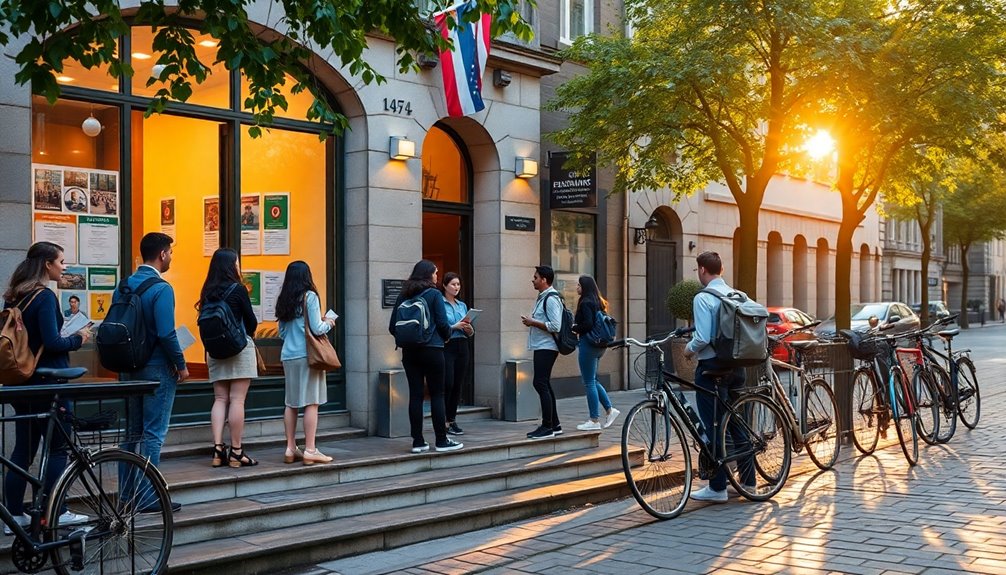
You’ll find practical answers about choosing an accredited English school in Ireland, matching courses to your goals, and checking teacher qualifications and class size. You’ll get clear steps on visas, required documents and timelines, plus estimates for tuition and living costs by city. Learn housing options, how to secure homestays or private rentals, transport and safety tips, and student services. Keep going and you’ll discover details on work rights, internships and post-study options.
Highlights
- Which courses suit my goals: general, academic, or exam-preparation (IELTS/TOEFL/Cambridge)?
- Do I need a short-stay or long-stay visa, and what documents and proof of funds are required?
- What are typical tuition and living cost ranges by city (Dublin highest, Cork/Galway mid, smaller towns lower)?
- What accommodation options exist (homestay, student residence, shared/private) and how do I secure them safely?
- Is the school accredited, what are class sizes and teacher qualifications, and what student support services are offered?
Choosing the Right English School in Ireland
When choosing the right English school in Ireland, you’ll want to match your goals, budget, and preferred learning environment to the program’s strengths; consider course focus (general, exam prep, or academic English), class size, teacher qualifications, accreditation, and student services like accommodation and visa support to make an informed decision. You’ll evaluate school accreditation to guarantee quality and transferability, compare program duration to fit your travel plans, and check class schedules for flexibility. Look for clear outcomes, sample lesson plans, and student reviews. Prioritize schools that let you learn efficiently while keeping independence and choice.
Visa and Immigration Requirements for International Students
After you’ve narrowed down schools and programs, you’ll need to understand Ireland’s visa and immigration requirements so your study plans aren’t interrupted. You’ll check whether you need a short-stay or long-stay visa, gather required documents, and submit your visa application online. Know entry clearance timelines, proof of funds, medical insurance, and acceptance letters. Once in Ireland, you’ll follow the immigration process to register with immigration authorities and obtain your residence permission. Keep records, meet reporting requirements, and renew permissions before expiry. Staying informed lets you pursue studies freely while complying with Irish immigration rules and timelines.
Cost of Living and Tuition Estimates by City
Although costs vary by location and lifestyle, knowing typical tuition and living expenses by city helps you budget realistically for study in Ireland. You’ll find cost comparisons showing Dublin as the most expensive: higher tuition and city averages for food, transport, and extras. Cork and Galway are mid-range, with lower tuition fees at some schools and modest city averages for daily expenses. Limerick and smaller towns generally offer the lowest overall costs, though options vary by program. Use these city averages and cost comparisons to choose a school that matches your financial freedom and study goals.
Accommodation Options and How to Secure Housing
Because where you live will shape your daily experience as much as your choice of school, it’s important to know the main accommodation types—homestays, student residences, shared flats, and private rentals—and the pros and cons of each so you can pick what fits your budget, lifestyle, and study needs. You’ll want student housing that balances independence and community. Homestays offer immersion; residences give services; shared flats cut costs; private rentals give freedom. Check rental agreements carefully for deposits, notice periods, and included bills. Use school placement services, reputable websites, and viewings (virtual or in-person) to secure housing quickly and safely.
Transportation, Safety, and Local Student Services

When you arrive in Ireland you’ll find reliable public transport, straightforward safety norms, and a range of local student services that together make daily life manageable while you study; knowing how buses, trains, cycling routes, and campus support systems work will help you plan your days and stay safe. You’ll use integrated ticketing and apps for schedules, and cycling is often practical in smaller cities. Student safety is supported by well-lit streets, campus security teams, and emergency numbers. Local services include health centers, counseling, student unions, and orientation programs. Learn routes, register with services, and carry ID for smoother daily freedom.
Work Rights, Internships, and Post-Study Opportunities
If you plan to work or intern while studying in Ireland, you’ll need to understand the visa rules, permitted hours, and any sector-specific restrictions that apply to your course and nationality. You can usually work part-time during term and full-time during vacations, but hours depend on your visa. Explore work opportunities on campus, hospitality, and local businesses, and seek courses that connect with employers. Internship programs may be credited or voluntary; confirm placement eligibility and insurance. After finishing studies, check the Third Level Graduate Scheme and other post-study routes to stay, work, or gain further training legally and strategically.
Some Questions Answered
Are There Language Exchange Meetups Specifically for Beginners?
Yes — you can find language partners and conversation clubs aimed at beginners. You’ll often see beginner-friendly meetups hosted by community centers, libraries, or online platforms; they’re relaxed and supportive so you can practice freely. Look for groups labeled “beginner” or “A1/A2,” and try language exchange apps or university noticeboards to connect with patient language partners. Go along with low expectations and enjoy practicing without pressure.
How Do I Open a Bank Account as a Short-Term Student?
Like Odysseus finding a safe harbor, you’ll open a bank account by visiting a branch or applying online with bank requirements: passport, visa or letter of acceptance, proof of address (hotel or school can sometimes suffice) and student ID. Some banks accept short-term students; check for “international students” options and low-fee accounts. Bring originals, ask about online access and ATM limits, and compare fees so you keep freedom of movement.
Can I Continue Online Classes With My Home University While in Ireland?
Yes — you can often continue online learning with your home university while in Ireland, but it depends on university policies and visa rules. Check your home institution’s course eligibility, attendance requirements, and assessment arrangements, and confirm that your Irish stay doesn’t violate enrollment terms. Also verify time zone, internet access, and any residency requirements for exams. Coordinate with both institutions so your studies remain compliant and uninterrupted.
What Healthcare Services Are Covered for Short-Stay International Students?
An ounce of prevention’s worth a pound of cure — you’ll usually need private health insurance that covers emergency care, GP visits and hospital treatments while you’re in Ireland. Policies vary, so check what’s included for prescriptions, mental health and dental care. Medical facilities accept insured patients, but you might pay upfront and claim later. Don’t assume coverage; compare plans and get proof of health insurance before you travel.
Are There Student Discounts for Cultural and Tourist Attractions?
Yes — you’ll often find student tickets and discounts for museums, galleries, tours and cultural experiences. Bring a valid student ID or international student card to get reduced entry or concession rates; some attractions and transport providers offer online student fares. Check student unions, school noticeboards and tourism sites for promo codes or package deals. Discounts vary by venue and season, so plan ahead to maximize savings and freedom to explore.
Summing Everything Up
Think of choosing an English school in Ireland like planting a tree: you pick fertile soil (the right city and program), tend it with paperwork (visas, finances, housing) and give it light (transport, safety, local support). Over time, branches grow into work, internships and post-study options. If you plant wisely and stay informed, your roots will hold—you’ll flourish academically, professionally and personally in Ireland’s welcoming landscape.
